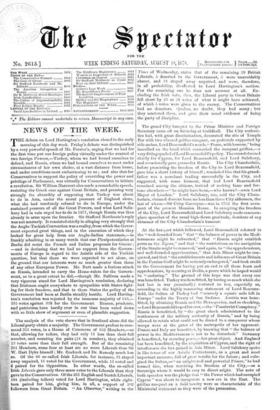The analysis of the vote shows that in Scotland alone
did the Liberal party obtain a majority. The Government profess to com- mand 351 votes, in a House of Commons of 652 Members,—so that, allowing for tellers, they had only 11 less than their full . number, and counting the pairs (24 in number), they obtained
t 13 votes more than their full strength. But of the remaining 301 Members, some four at least are no more Liberals than Sir IV. Hart Dyke himself ; Mr. Roebuck and Dr. Kenealy much less so. Of the 66 so-called Irish Liberals, for instance, 31 stayed away unpaired, 16 voted for the Government, while 13 voted and 6 paired for the Opposition. In other words, the so-called Irish Liberals gave only three more votes to the Liberals than they gave to the Conservatives. Of the 231 English and Scotch Liberals, Times of Wednesday, states that of the remaining 29 British Liberals, 5 deserted to the Government, 5 were unavoidably absent, and 18 stayed away unpaired, and were, therefore, in all probability, disaffected to Lord Hartington's motion. For the remaining one Ile does not account at all. Ex- cluding the Irish vote, then, the Liberal party in Great Britain fell short by 23 or 24 votes of what it might have achieved, of which 5 votes were given to the enemy. The Conservatives had no deserters. Qualms, no doubt, they had many ; but they mastered them, and gave their usual evidence of being the party of discipline.






























